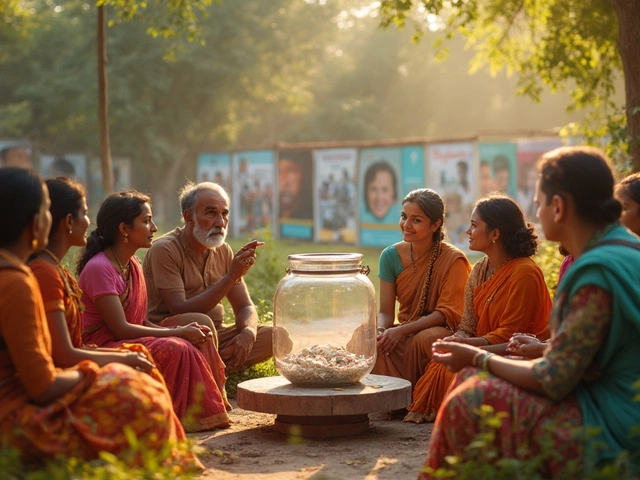If you think volunteering is all about helping others, you’re only hearing half the story. Sure, you’re making a difference, but have you ever considered what you personally get from it? Honestly, a lot of people start out wanting to help their community—then stick around because the payoff for themselves is unexpectedly huge.
We’ll get down to the details: better moods, new friends, and skills you didn’t even know you needed. Volunteering can sneakily give your career a boost and sometimes comes with cool extras—like access to events or free training. If you’re wondering whether it’s worth your time or just feel stuck in a routine, volunteering can shake things up in a good way.
Let’s look at the real benefits that regular people experience when they volunteer, plus a few tips to help you get the most out of every hour you give.
- What Is Volunteering Really About?
- Mental and Emotional Benefits
- Boosting Your Skills and Career
- Building New Connections
- Perks and Surprising Extras
- Making the Most of Your Volunteer Experience
What Is Volunteering Really About?
People throw around the word 'volunteering' all the time, but what does it really mean? At its core, volunteering is giving your time and effort to help out—without getting paid. Usually, you do it to support causes or people that matter to you, but there’s more going on than just giving back.
Let’s clear up a big myth right away: volunteering isn’t just about sacrificing your free time or filling out community service hours. It’s about showing up, building trust with others, and sometimes even learning what you care about most. According to the U.S. Bureau of Labor Statistics’ last full survey, over 25% of Americans volunteered at least once during the year. That’s not small potatoes—it’s millions of people choosing to get involved, from cleaning up parks to tutoring online.
Volunteering can take all sorts of shapes. Here are a few real-life examples:
- Pitching in at animal shelters or rescue centers
- Playing board games or reading to seniors in nursing homes
- Helping out at food banks or soup kitchens
- Mentoring kids or teens through school programs
- Joining beach, street, or trail clean-ups
You don’t always need a fancy resume or tons of free time, either. Some people spend a few hours every month, while others fit short-term projects into busy lives. It’s flexible, and there’s usually a role for every age, background, or skill set.
When folks talk about volunteer benefits, they’re not just making it up. Research shows that consistent volunteering can actually reduce stress and give people more purpose. More on that in the next section, but know this: it’s not just about helping others—you’re building yourself up, too.
Mental and Emotional Benefits
It’s easy to underestimate how much volunteering can boost your mood. Multiple studies, like one published by the Journal of Happiness Studies, show that people who volunteer regularly report feeling happier and less stressed. Even volunteering just a couple of hours a week can give you a noticeable lift.
Helping someone else or working on a project for a good cause triggers your brain to release feel-good chemicals like dopamine and oxytocin. So it’s not just a nice idea—it’s literally changing the way you feel inside.
There’s more. Volunteering gives you something positive to focus on, especially if you’re dealing with stress, grief, or feeling isolated. For folks struggling with anxiety or depression, being part of a volunteer team can spark real hope and motivation to keep pushing forward. The sense of purpose and accomplishment you get doesn’t just disappear once you head home.
Here are some common mental and emotional volunteer benefits you might notice:
- Lower stress levels
- A boost in self-esteem and confidence
- Less loneliness—especially for people new to a city or retired
- Better ability to manage life’s regular anxieties
- More positive moods and a general sense of happiness
If you like facts, check out this data from a 2023 survey of volunteers in the U.S.:
| Mental Health Benefit | % of Volunteers Noticing Benefit |
|---|---|
| Felt happier overall | 78% |
| Less stressed | 66% |
| Less lonely | 53% |
The takeaway? You don’t need to meditate on a mountain or splash out on therapy to feel better—sometimes showing up for a volunteering gig really does the trick. Try different types of projects and notice how your mood shifts. If you’re looking for a real boost, this is one of the easiest ways to get going.
Boosting Your Skills and Career
A lot of folks overlook this, but volunteering is one of the best ways to pick up real-world skills without sitting in a classroom. Whether you’re answering phones, running social media, or helping out at events, you're learning stuff companies want—and you’re proving you can do it under pressure.
Let’s talk specifics. Need leadership experience for your resume? Coordinating a volunteer team gives you exactly that. Want to work on your communication? Nonprofits often toss you right into group settings, helping you get comfortable with all sorts of people. It’s the same with problem-solving and adaptability. You never know what’s coming next, so you learn to think on your feet.
| Skill | How Volunteers Gain It |
|---|---|
| Project Management | Organizing charity events or campaigns |
| Teamwork | Collaborating with other volunteers |
| Public Speaking | Hosting workshops, speaking at fundraisers |
| Digital Skills | Managing websites, social media for causes |
It’s not just about skills, though. Volunteering often helps your career move forward. LinkedIn’s survey found that 41% of employers see volunteer work as just as valuable as paid work. People who volunteer have a better shot at getting hired—especially when they’re switching fields or just starting out.
Here’s what Sherry Olson, a nonprofit hiring manager, said about it:
“When I see someone with volunteer experience, I know they’re motivated, able to handle challenges, and they care about more than a paycheck. That stands out in any field.”
- Update your resume with your volunteer experience—list roles just like jobs.
- Ask for a reference from a volunteer supervisor.
- Keep track of hard skills and software you use, like CRMs or graphic design tools.
If you’re eyeing a career change, volunteering also lets you try out an industry with zero pressure. You can experiment—see what you like, meet insiders, and even land “real” jobs through the network you build by pitching in. Volunteering is hands-down practical for personal growth and smart for your career at the same time.

Building New Connections
When it comes to volunteer benefits, meeting people is one of the most underrated bonuses out there. Volunteering puts you in the middle of a group that usually cares about the same things you do, which makes it way easier to start real conversations. A UnitedHealth Group study showed that 76% of volunteers said volunteering made them feel healthier and connected to others. That kind of social boost can be powerful, especially if you’re new to an area or looking to expand your circle outside work or family.
Most volunteer opportunities bring people from different backgrounds together. This means you get to work with folks outside your usual bubble, which can spark new interests and sometimes even lead to future jobs. Think of a food bank, animal shelter, or local event—every project has people behind it. You’ll build teamwork skills just by showing up and working together toward something that matters.
There’s a huge networking upside, too. A lot of jobs aren’t filled by cold applications—they’re filled because you’ve met someone who trusts you or has seen you in action. Volunteering is a low-pressure way to show what you can do and get noticed by people who could help your career down the road.
Want to get the most out of volunteering for social growth? Try these tips:
- Choose projects that match your interests—conversation comes naturally when you care about the cause.
- Don’t be shy about introducing yourself or asking others about their experiences.
- If you’re nervous about meeting new people, team up for a shared task—nothing bonds people faster than working side-by-side.
- Follow up with new contacts you click with. A friendly message after an event goes a long way.
Look out for organized volunteer meetups or socials. Groups like Habitat for Humanity and the Red Cross often host workshops, mixers, or thank-you parties to help volunteers get to know each other. It all adds up: volunteering is a simple way to find your people and maybe open unexpected doors.
Perks and Surprising Extras
Most people think of volunteer benefits in terms of good feelings or personal growth, but there’s often more on the table. Plenty of organizations offer extras to keep volunteers motivated and appreciated. Some of these perks might surprise you.
First up, free stuff! Many volunteers get access to things the general public pays for. If you volunteer at a museum or zoo, chances are you get free admission for yourself or sometimes your family. Hospitals and community groups often hand out free t-shirts, meals, or small gifts at events. It’s their way of saying “thanks.”
If you’re with a big festival or sports event, don’t be shocked if you get backstage passes or free tickets. Some volunteers get exclusive training—think CPR classes, tech workshops, or even language courses—that can beef up your resume.
Want to see how these benefits actually stack up? Here’s a real-world look at volunteer perks from some big organizations:
| Organization | Volunteer Perks |
|---|---|
| Smithsonian museums (U.S.) | Free tours, discounts at museum shops, invites to special events |
| British Red Cross | Free training courses, travel reimbursement, access to mental health support |
| Toronto International Film Festival | Free film screenings, volunteer-only parties, swag bags |
Here’s something you might not expect: some volunteer gigs can even earn you academic credit or count toward graduation requirements. High school and college students often take advantage of this.
And don’t forget the small surprises—networking events, reference letters, and sometimes even exclusive job openings go to loyal volunteers first. Here’s how Neil Nicoll, former president of the YMCA of the USA, put it:
“Volunteers often gain access to opportunities and experiences they might not encounter anywhere else.”
If you’re looking into volunteer opportunities, it’s worth asking what extras are available. Sometimes a simple question opens a door you didn’t even know existed.
Making the Most of Your Volunteer Experience
It’s easy to sign up for a volunteer spot—what counts is how you make it count for you. Whether you want to boost your resume, meet people, or just try something new, a little planning turns the usual volunteer benefits into something you really notice in your life.
First off, don’t just say yes to the first chance that pops up. Look for organizations or causes that match what matters to you or what you want to learn. Did you know that volunteers who work in areas they care about are almost twice as likely to stick to it long-term (according to a 2023 study by VolunteerMatch)? That means more time to actually grow—and more rewards later on.
- Set personal goals: Want new job skills, a letter of reference, or just to break out of your bubble? Say it out loud. Let your volunteer supervisor know what you hope to get.
- Get involved in planning: Ask if you can help with event setup, budget talks, or social media tasks. The more angles you see, the more you’ll stretch your brain and your skills.
- Talk to everyone: Don’t just stick with the same folks every time. Say hi to staff and volunteers you don’t know. Making connections turns boring shifts into networking gold.
- Ask for feedback: Find out what you’re doing right and where you can step it up. Good feedback can help you grow fast and fix blind spots.
- Keep track of your wins: Write down new things you’ve learned or challenges you’ve tackled. This list is gold when you apply for jobs, scholarships, or just want to see how far you’ve come.
Some groups even track impact numbers for their volunteers. For example, Habitat for Humanity regularly shares how many hours volunteers have put in and what that work has accomplished. This lets you see the direct results of your effort—a pretty awesome feeling that keeps you motivated.
| Tip | Why It Helps |
|---|---|
| Pace yourself | Avoid burnout and keep your energy up for the long haul |
| Try different roles | Discover interests you didn’t know you had, pick up varied skills |
| Log your hours | Proof of commitment for job apps and yearly recognition programs |
| Join training sessions | Boost your volunteering impact and up your personal growth game |
And hey, never be afraid to speak up. If something feels off or your tasks feel repetitive, ask for a change. As Anne Wilson, a manager at the American Red Cross, put it:
“Our best volunteers are the ones who tell us where they want to grow. When volunteers bring their goals, we help them find a spot that fits—and that’s when everyone wins.”
So don’t settle for a basic experience. Shape your own volunteer benefits, set your sights on what matters, and watch what happens—you might surprise yourself.








